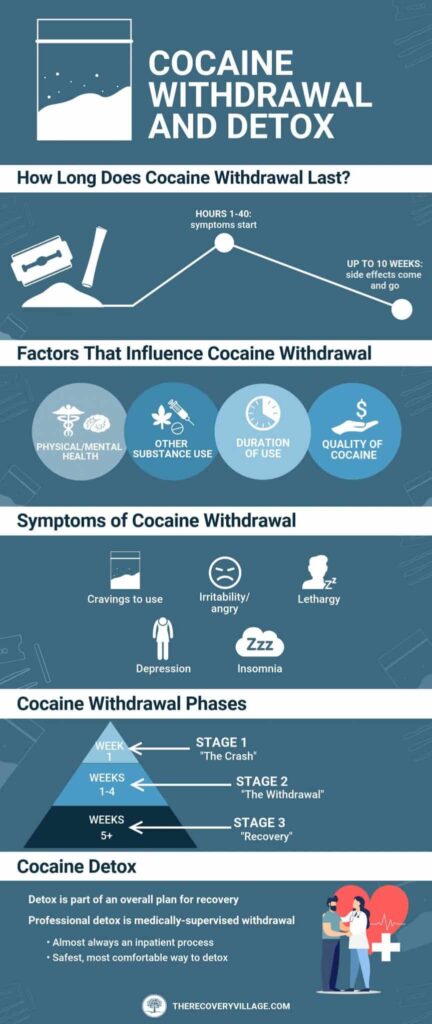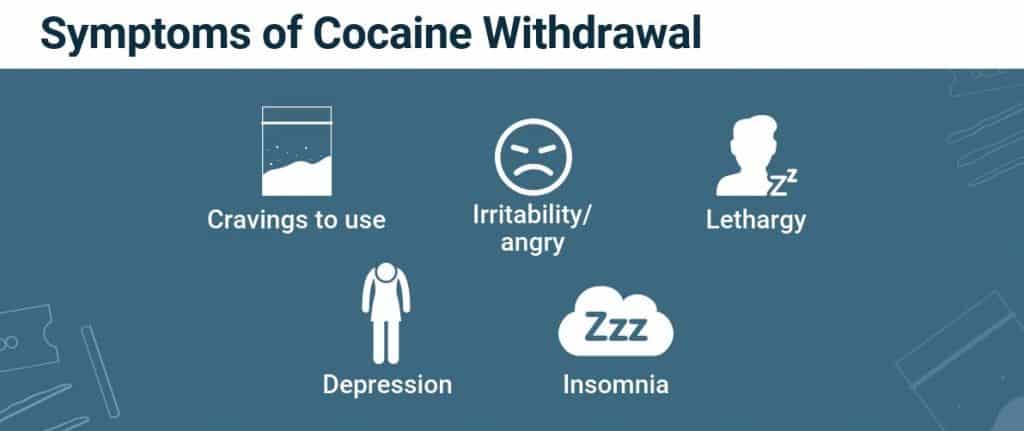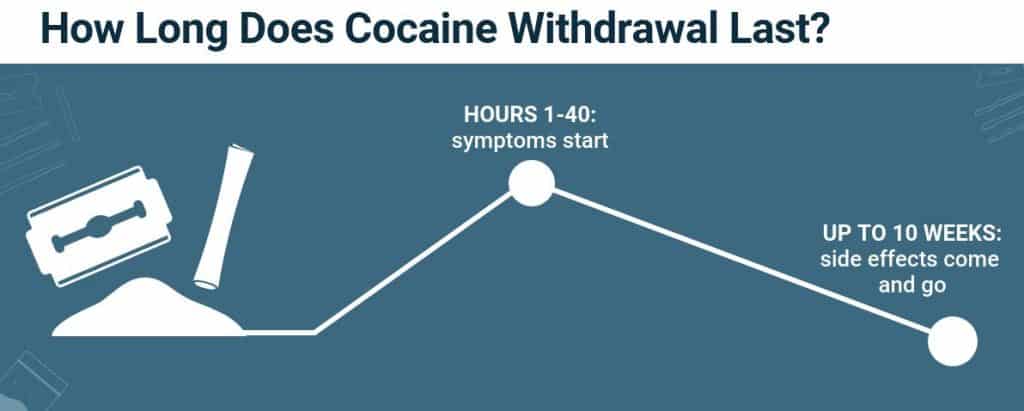Cocaine is a powerful stimulant that can be snorted, injected or smoked. Once addiction starts, the drug is difficult to stop because of withdrawal symptoms.
Stopping cocaine can cause withdrawal symptoms like fatigue, sleep disturbances and agitation. Cocaine withdrawal is one of the primary reasons people have trouble quitting the drug. People often report that cravings to use cocaine are strong during the detox process. Cravings can quickly hijack the recovery process, resulting in a relapse.
Many people who use cocaine are unable to stop when trying to do it alone. The side effects and cravings caused by withdrawal are more uncomfortable than many realize. With physician-assisted detox and close supervision, patients can safely flush the drugs from their system and prepare their body and mind for the recovery process

Article at a Glance:
- The symptoms of cocaine withdrawal are most intense right after the last usage of the drug.
- Cocaine withdrawal symptoms usually last a few days but may extend for multiple weeks for heavy users.
- A person’s level of use, quality of cocaine used, other substance abuse and overall health will affect withdrawal symptoms.
- The body needs time to readjust to life without cocaine and adopting healthy lifestyle habits can help.
- The recovery process from cocaine addition involves medical detox, treatment and aftercare.
Cocaine Comedown vs. Cocaine Withdrawal
A cocaine comedown and cocaine withdrawal are two similar but different concepts.
A cocaine comedown occurs after a binge. When a person takes a stimulant like cocaine after heavy or binge use, they reach a point where they can no longer experience a high. This is because a high comes from excess levels of the neurotransmitter dopamine in the brain. When someone binges on cocaine, the brain eventually becomes depleted of dopamine. These lower levels of dopamine lead to a crash, or comedown. During a comedown, a person becomes extremely fatigued and may sleep for days. For many stimulants, a comedown can last up to three days.
Treatment Can Be Life Changing. Reach out today.
Whether you are struggling with addiction, mental health or both, our expert team is here to guide you every step of the way. Don’t wait— reach out today to take the first step toward taking control of your life.
In contrast, cocaine withdrawal occurs when a person is physically dependent on cocaine, whether or not they use the drug heavily. When you are physically dependent on a drug, your body begins to rely on it to feel normal. If you suddenly stop using the drug, withdrawal symptoms can occur as your body struggles to adjust. Cocaine withdrawal symptoms can last for up to two weeks.
How Long Does a Cocaine Comedown Last?
Little information exists on how long a cocaine comedown usually lasts. However, similar stimulants like meth have been studied, with the comedown period lasting up to three days. Because meth and cocaine are both stimulants that work similarly in the brain — increasing the dopamine levels during a binge until a crash occurs — the comedown period is likely similar for both drugs.
Cocaine Withdrawal Symptoms
Cocaine withdrawal symptoms occur when a person becomes dependent on cocaine to function normally. If you are physically dependent on cocaine and stop taking the drug, you will have withdrawal symptoms.

Cocaine withdrawal signs and symptoms can include:
- Agitation
- Irritability
- Depression
- Excessive sleep
- Increased appetite
- Muscles aches
Strong cravings are also common during the withdrawal period. These cravings can persist and may last weeks even after a person has quit cocaine.
Related Topic:Cocaine side effects
Cocaine Withdrawal Timeline & Factors
Different factors affect the timeline and severity of withdrawal symptoms. However, in general, most people follow a similar timeline.

Week 1:
During this time, a person experiences mood symptoms, cravings, irritability, trouble sleeping and intense cravings. Relapse is common during this phase because of the intensity of symptoms.
Weeks 1–10:
Symptom intensity dampens at this time, but cravings continue. A person may still have trouble with concentration and mood.
Week 10+:
Symptoms dissipate completely after 10 weeks, but a person may experience intermittent cravings based on external cues.

Each person’s cocaine withdrawal symptoms will be different. Exactly what types of symptoms, and how severe they are, will depend on the environment (school, home, work and others), history of traumatic events, other substance use or duration of cocaine abuse, peer pressure, and physical and mental health.
The safest course of action for anyone working through the cocaine withdrawal process is to enlist the help of rehab specialists and participate in medical detox.
Remedies for Cocaine Withdrawal Symptoms
The only guaranteed way to treat cocaine withdrawal is time. The body must readjust to normal levels of neurotransmitters and their matching receptors. The adjustment process is what causes the uncomfortable withdrawal symptoms, so it cannot be avoided.
To help weather cocaine’s harsh withdrawal symptoms, a person should take steps to heal and maintain a healthy lifestyle. It may not sound glamorous, but the first steps of recovery are simply developing healthy habits.
Some Remedies for Withdrawal Symptoms:
- Develop a regular sleep schedule and get at least eight hours of sleep each night
- Eat healthy food and do it on a regular schedule
- Exercise regularly, at least a few times per week
- Keep a regular schedule and wake up at a set time each day
- Start healthy habits like meditation, yoga and mindfulness
Can You Quit Cocaine Cold Turkey?
Cocaine is one of the few drugs someone can quit “cold turkey,” but doing it alone may not be the safest option.
Experts have studied cocaine withdrawal for years but have not developed a taper strategy for cocaine, whether by using less of the drug itself or a replacement substance. Therefore, the only way to detox from cocaine is “cold turkey.” A person has the option to do this by themselves or with the help of a drug rehab facility. Detoxing in a medical facility is safest because withdrawal symptoms can be treated as they arise, leading to fewer cravings.
Detox for Cocaine
Detox is when the body metabolizes cocaine and removes it from the body. People often attempt to detox from cocaine at home and ride out the withdrawal symptoms. However, cocaine causes intense cravings during withdrawal, which is one of many people’s main barriers to long-term recovery. A person detoxing alone will usually have more difficulty managing these cravings.

Medical detox is a supervised version of detox where a medical team oversees the process and provides support for cravings and other withdrawal symptoms. It also includes easing a person through withdrawal symptoms and medical support.
Typically, detox happens in a hospital or inpatient rehab center. Some people at risk for complications may detox in a hospital, while those who are medically stable will do so in a rehab facility.
How Long Does It Take To Detox From Cocaine?
It typically takes up to two weeks to detox from cocaine. However, some withdrawal symptoms like problems with impulse control may persist for longer periods.
Our Cocaine Detox Process
The recovery process is broken down into a few steps: medical detox, treatment and aftercare. Not everyone needs medical detox from cocaine, but it may be a critical step in the treatment of moderate to severe cases of cocaine addiction. Those who are still using cocaine when they enter treatment will usually start with medical detox.
During medical detox, a person will experience some or many of the withdrawal symptoms of cocaine. Cocaine detox is not long but can be uncomfortable for some people.
Those in detox can expect medical, nutritional and addiction support. Treatment centers may take the opportunity to screen for and treat infectious diseases. Detox is also an opportunity for physicians to diagnose and treat chronic diseases since it may be the first time the person is seeing a doctor in years.
In medical detox, diets are designed and administered by the treatment team. An individual will have more time to focus on their recovery and be better equipped to maintain a healthy diet once they leave.
After medical detox is complete, patients will be screened for entry into substance use disorder treatment. Treatment plans may continue in an inpatient (in the facility) or outpatient (live at home and commute to the facility) manner. Those who are ready for continued care can be admitted into a program at this time.
If you or a loved one is struggling with cocaine abuse, The Recovery Village can help. While detox at home is possible, it is not usually the safest option. Medical detox helps to ensure the process is safe and healthy. Inpatient and outpatient treatment programs can help provide tools and life skills necessary for long-term recovery. Call The Recovery Village today to learn more about a continuum of care that can springboard a lifetime of healing.








